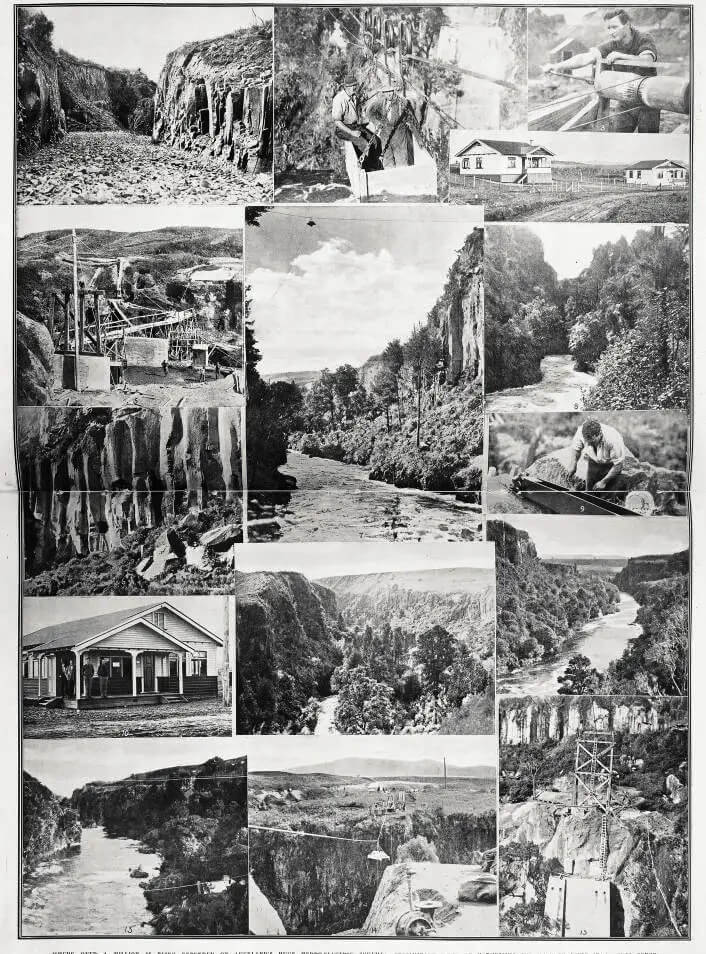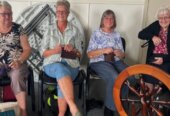Travellers desiring to inspect the site of the big hydro-electric works at Arapuni had not experienced the best facilities for making the motor journey between Te Awamutu and Putāruru owing to the mail cars on the Arapuni-Putaruru section not synchronising their departure time with the arrival at Arapuni of the Te Awamutu mail cars.

Arapuni 1924
These daily motor mail services operated as a taxi service as well. An Arapuni resident decided to run a car service between Arapuni and Putāruru in conjunction with Mr Turpin’s Te Awamutu-Arapuni twice daily service to fix the difficulty.
A Shorthorn cow, owned by Mr West, of Pokuru, was missing for 13 days before it was found lying in a swamp in four feet of muddy water. Everything within her reach had been eaten, including raupo, pampas grass, and rushes. Five men pulled the cow out with ropes, and within five minutes of being extricated she walked away. The cow was very emaciated, and had lost a good deal of hair. Successful efforts were made to restore her to normal condition. She was fed on maize and turnips, and milked once a day for several days, completely recovering from her ordeal.
A Spinsters’ Ball at Pirongia was enticingly advertised as featuring ‘Pretty Girls, Lovely Frocks, Discreet Chaperones, Excellent Floor, Dalton’s Orchestra, and a Gorgeous Supper.’ “You ought to be there”, said the notice, adding that “Parson’s Charabanc will leave Te Awamutu Post Office for Pirongia at 7.30pm.” The ball was a triumph, the Memorial Hall being crowded with happy dancers and spectators. The hall had been specially decorated for the occasion, an exciting feature being the electric lighting effects.
Sequah, a celebrity quack doctor, thrilled Te Awamutu with his appearances at the Town Hall. He stated that he was not a miracle worker or a cure-all, but the remedies which he was advocating worked. To demonstrate the efficiency of his remedies he asked Mr H McConkey, an old resident Te Awamutu, who had been suffering from sciatica for seven years and had to use a stick to get about, to step on the stage to be treated. After treatment, Mr McConkey declared himself entirely free from pain and offered to demonstrate this by sprinting the length of the hall. The next case was Mr Mclnnes, of Teasdale Street, who had suffered from neuritis for five years and had been unable to work for three months. After treatment Mr Mclnnes stated that he was quite free from pain.
The following night Mr Robert Webster, of Kihikihi, who was in a crippled state and whose chances of recovery were considered to be practically hopeless, was cured. He had suffered from sciatica for 25 years, and had had to use a stick to aid him walking for over a year. He had been a patient in Dunedin Hospital for 16 weeks, and also at Rotorua, taking the baths for eight weeks.
After treatment by Sequah, Mr Webster was much relieved and able to get about freely. He stood up smartly and walked from the stage down the steps to the body of the hall, stepping out briskly to the accompaniment of loud applause.









